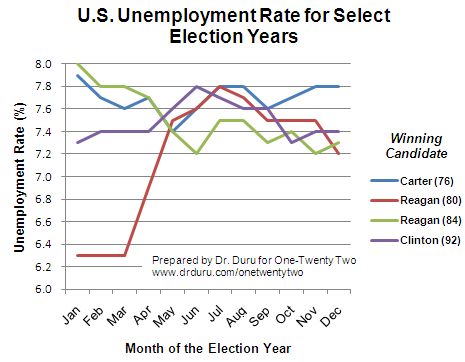I keep hearing the ominous statistic that no sitting U.S. President has ever won an election with unemployment over 7.2%. I finally decided to look more closely at the numbers after I read another version of this statistic that said no U.S. President since the 1930s has ever won an election with unemployment over 7.2%. There are several things which made me suspicious of these numbers:
- 7.2% is an extremely precise number. No one has offered an explanation for why 7.2% is a magical threshold.
- During the 1930s and then the early 1940s, Franklin Roosevelt won four elections. Economic conditions were miserable during the Great Depression. Yet, FDR won election after election. Surely, unemployment was not the overriding concern amongst voters during those dark times when deciding whether to dump FDR.
- Sitting U.S. Presidents very rarely lose elections. So, I suspected that the choice of 7.2% rose the bar to fortuitously isolate the losers.
- The unemployment rate rarely goes above 7% in the U.S.
Sure enough, a quick examination of the numbers exposes how meaningless it is to warn that a U.S. President cannot win an election with unemployment over 7.2%.
The Bureau of Labor Statistics provides monthly unemployment data back to 1948. I married these data with the results of U.S. presidential elections from wikipedia.
Here is what I found:
- 16 total elections
- 8 elections featuring a sitting U.S. President
- 3 elections where incumbents lost: Ford, Carter and Bush #1. The unemployment rate in November of those election years was 7.8%, 7.5%, 7.4% respectively. In October, the rates were 7.7%, 7.5%, and 7.3% respectively.
- The four highest unemployment rates in ANY November during an election year: 7.8%, 7.5%, 7.4%, 7.2%.
- What happened when unemployment was 7.2% in November, 1984 (and 7.4% in October, 1984)? Ronald Reagan won in an historic landslide, smashing Walter Mondale 525 to 13 electoral votes.
- Of the 756 months between January, 1948 and December, 2010, the unemployment rate has been at least 7% for 164 months (22% of the time). Of the 192 months in an election year, unemployment has been at least 7% for 45 months (23%). These months are isolated to the key election years of 1976, 1980, 1984 and 1992. Unemployment went to 7.3% the month after Barack Obama was elected.
Reagan’s victory alone throws serious doubt into the assumption that a high unemployment rate kills a U.S. President’s chance to win an election. Reagan’s crushing margin of victory speaks volumes that the unemployment rate is more likely one of many important factors running through the minds of voters when judging the performance of an incumbent. Reagan won in 1984 with the unemployment rate just as high as it was when he won in 1980. Moreover, the difference between a 7.2% unemployment rate and 7.4% is insignificant. In fact, I am willing to bet that the average American voter feels no better when unemployment is at 7.2% or 7.8%. I would also bet that the strength of the challenger and his/her ability to portray the incumbent as unable to make future improvements is a much more important factor than the existing level of unemployment.
Even the trend going into the election cannot be used as a clear determining factor. When Carter beat Ford, unemployment was down from 8.3% the previous November and was ever so slowly coming down throughout 1976. Unemployment was definitely rising when Reagan thumped Carter, but it kept rising the first two years of Reagan’s presidency before peaking at 10.8%. When Reagan won in 1984, the unemployment rate was down from 8.5% the previous November but had stalled out above 7% and would remain so for the next two years. When Clinton beat Bush, the unemployment rate was up from the previous November of 7% but down from the peak in 1992 of 7.8% (June).

From any vantage point I take, the data do not allow us to conclusively and unambiguously claim that high unemployment rates decide the outcome of (modern) U.S. presidential elections.
Certainly, a high unemployment rate is never a good thing and will never be part of an incumbent’s party platform. However, we need a lot more data before concluding that the unemployment rate alone can seal the deal on a loss for an incumbent President.
Be careful out there!
Full disclosure: no positions
